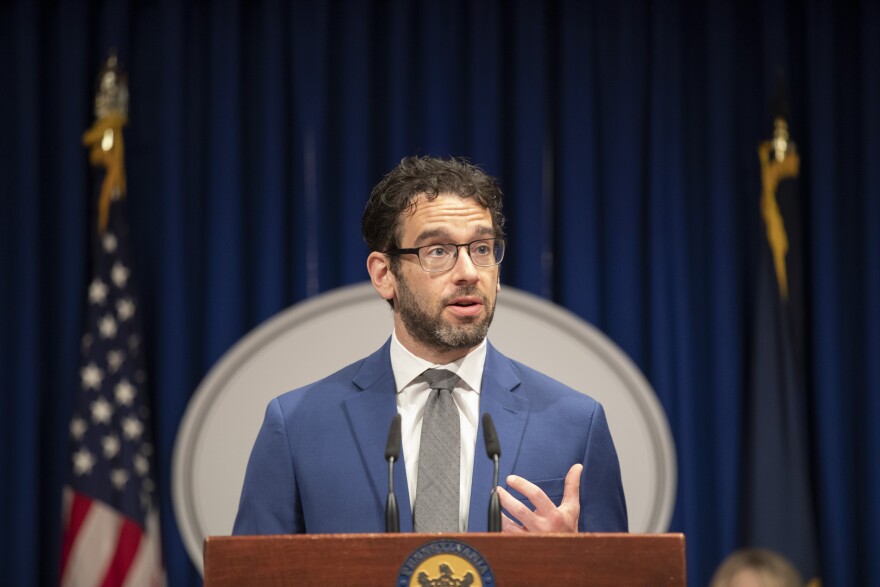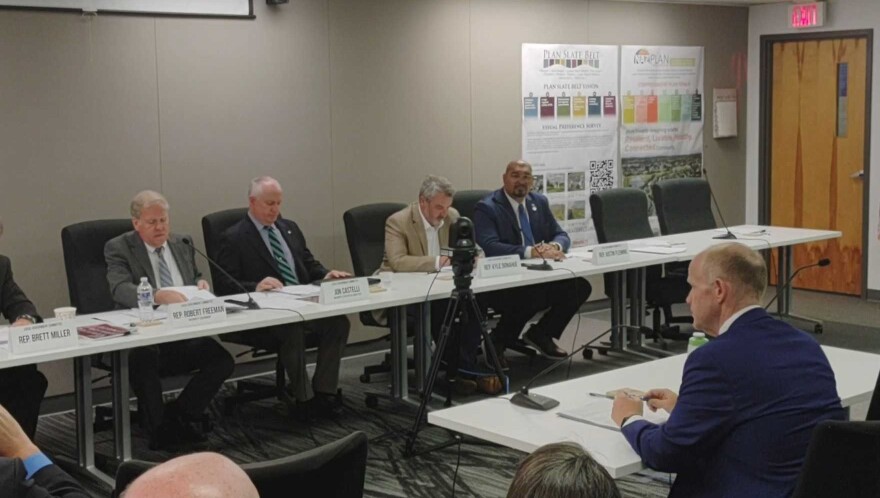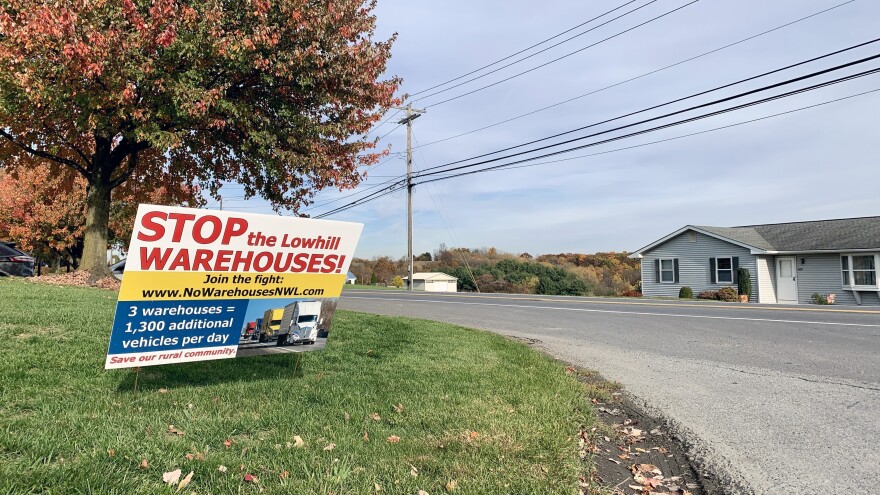LOWER NAZARETH TWP., Pa. — What if the answer to managing warehouse development lies not along the highways and local roads that carry truck traffic, but instead at the state Capitol in Harrisburg?
Lower Nazareth Township Manager Lori Stauffer thinks the answer to managing the influx of development is to make changes to the Pennsylvania Municipalities Planning Code (MPC), a state law that has been on the books since the 1960s.
“It doesn't give municipalities a whole lot of teeth in asking for what it needs in order to accommodate development — we're very restricted as far as what we're allowed to require a developer to do,” Stauffer said.
Lower Nazareth sits close to Routes 22 and Route 33, which provide easy access to Interstate 78, making it like other Lehigh Valley communities a magnet for large logistics operations.
Stauffer estimates the township has about 9 million square feet of warehouses – equivalent to the amount of preserved farmland in Lower Nazareth.
“The (Municipalities Planning Code) puts municipalities in a position where you're playing in the Super Bowl. They've got like the MVP team, and you've got the little high school fourth-string team."Lori Stauffer, Lower Nazareth Township manager
She argues that the MPC now leans too pro-developer, having taxpayers foot the bill for many residual impacts of large developments.
“If you have a developer who is several hundred feet from an intersection, and you're showing that their development is most likely going to impact the quality of that intersection, because that intersection is several hundred feet away from their project, we're not allowed to (require) them to do anything to improve that intersection,” Stauffer said.
“That becomes the responsibility then of the taxpayer. How is that fair?”

Proposed legislation
The MPC was originally passed in 1968 and has since seen limited revisions. It provides the general procedures, revisions and requirements for local municipalities’ laws surrounding land developments.
To overcome the challenges and add ways for municipalities to manage growth, state Rep. Mike Schlossberg has pushed for a change that would allow more leverage in limiting the negative consequences attached to developments like warehouses.
The bill, HB-782, would require high-impact projects to conduct more intensive impact studies on surrounding areas for pollution, traffic and safety.
He says the bill is “trying to alter the playing field a little bit.”
“I don't want to stop warehouses,” said Schlossberg, D-Lehigh. “Warehouses, and things that people often regard as warehouses, are on the whole a net positive. They bring in a lot of jobs, a lot of tax revenue and a lot more businesses to the Valley and that's good.
“But what I do want to do is make sure that municipalities can make additional requirements in terms of infrastructure development, water, sewer and traffic mitigation."
He said he’s heard a lot of anger over the Lehigh Valley’s warehouse boom.
“I've had no shortage of constituents screaming at me that if I personally dynamited every warehouse in the country I'd get re-elected for the rest of my life," Schlossberg said.

"There's a lot of anger at warehouses and many developments and I get it, I do. But it's sort of a situation where you can't have your cake and eat it, too.
"We've got to continue to grow as a region in order to be prosperous and successful. We just have to make sure that we've balanced that growth with reasonable quality-of-life measures that can mitigate the negative impacts of these developments.”
He said in an ideal situation, local governments would have more information to get greater concessions out of developers. That would include infrastructure improvements that accurately adjust to the impact made in areas like stormwater runoff, traffic and water and sewer capacity.
Schlossberg acknowledges, though, that getting there is a very complex process.
His proposed legislation was referred to the House Rules Committee in June, moving from the Local Government Committee. Schlossberg said in July he was unsure when it would be acted on next, given that other legislators had remaining issues.
In a hearing with local experts last September, those in the Lehigh Valley had both hopes and reservations about the bill. Many noted language about what qualifies as a significant development needs to be tightened, and it needs to be clarified who is qualified to conduct such studies.
Kristin Cahayla-Hoffman, vice president of business development and attraction at the Lehigh Valley Economic Development Corporation, said at that meeting that requiring developers of significant projects to conduct those studies would make the Lehigh Valley and Pennsylvania less competitive with other markets.
"The governor wants to streamline permitting and move at the speed of business so that Pennsylvania can compete to win major projects and the jobs that come with them," Cahayla-Hoffman said, repeating a favorite talking point of Gov. Josh Shapiro. "(The bill) creates uncertainty. It puts more obstacles in the way of business.”
Lower Nazareth’s Stauffer voiced some pessimism about the efforts to pass the bill, noting that legislators in other parts of the state did not wish to hamper development.
However, she argues that changes outlined in the bill would not prohibit a municipality from letting in any developments; it would give municipalities more options to control development if they wished to implement it.

“The MPC puts municipalities in a position where you're playing in the Super Bowl. They've got like the MVP team, and you've got the little high school fourth-string team,” Stauffer said.
“That's kind of what I've always compared it to. That's how much of an advantage the MPC gives developers compared to any control that we have as a municipality."
Stauffer says as it stands, concerned residents should attend meetings during the conditional use process to ask applicants questions and address elected supervisors or commissioners, because once a project is before the governing body, a denial risks a legal battle and deemed approval.
Let the people decide
Another bill amending the MPC, HB-1960, was introduced by state Rep. Joe Emrick. It proposed to give residents a “final say” over what his bill calls “high-impact” warehouses.
The proposed legislation would require a voter referendum for a warehouse or distribution center of regional significance — at least 100,000 square feet in size on at least three acres of land.
“I have heard loud and clear from local officials about the need for more local control in the Pennsylvania Municipal Planning Code,” Emrick, R-Northampton, said in a news release in January. “This way the community can say with one voice when and how this kind of growth should continue.”
Emrick did not return a request for comment for this story. The bill currently sits in the House Local Government Committee.
Lack of political will
Schlossberg and others like Stauffer and Lehigh County Commissioner Ron Beitler agree that getting legislation amending the MPC through the state Legislature won’t be easy.
They say representatives from other areas of the state have not supported bills like Schlossberg’s and Emrick’s out of the desire for any type of development, and not waiting to appear anti-business.
Said Stauffer: “Central and western Pennsylvania look at us and feel that we shouldn't complain that what we've been given is an embarrassment of riches, and we should appreciate what has been given to us and they would love to have what we have.
“But the thing is, if there's changes made to the Municipalities Planning Code, it's not prohibiting any municipality from letting in whatever development they want to let in. It's just for those of us who are looking to control it a little bit better. It's just giving us the tools we need in order to do that.

“But unfortunately, that whole movement died. And the MPC still sits as it was from 1968.”
Schlossberg said the solution lies in providing tools, but not making municipalities use them.
“It's easy to forget that there's really only a few regions in Pennsylvania and or massive states that are growing like we are,” he said.
Optimism for the future
Schlossberg said as efforts proceed, his bill will need to be significantly amended.
“I think that as written, my bill misses the mark right now, because it's too broad,” he said.
“It requires too many different studies and creates too many different opportunities to straight-up stop development. And that's not what I want to do.”
Schlossberg says the bill in its current form creates too many impediments to development.

“Local governments are creatures of the state government, they function based on the parameters that we set at the state level and to a lesser extent, that federal law dictates,” Schlossberg said.
“So people have to understand that our local government leaders are doing the best they can with the tools that they're given. And if local government leaders lack adequate tools, more often than not, I think that's on us.”
He said he understands where warehouse opponents are coming from, but urges caution.
“Our strength as a region comes in large part because of our continued growth,” Schlossberg said.
“If we're going to tweak that growth, we need to make sure that the way we tweak that growth is limited and reasonable and not any more excessive than it absolutely has to be."
RELATED STORY: Managing warehouse proliferation: The search for solutions
COMING TOMORROW: END OF THE BOOM?
For much of the past decade, warehouses sprang up like dandelions across the Lehigh Valley. While the market is by no means in free fall, experts say it has undeniably slowed since 2022. Is it a lull, or has the warehouse boom come to an end?


